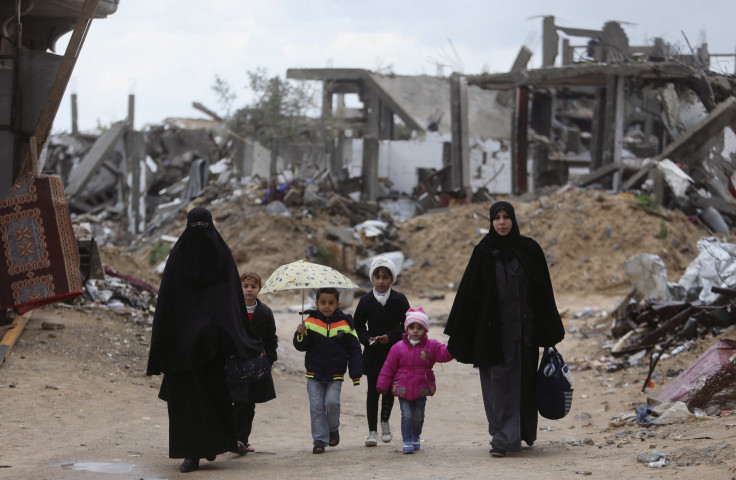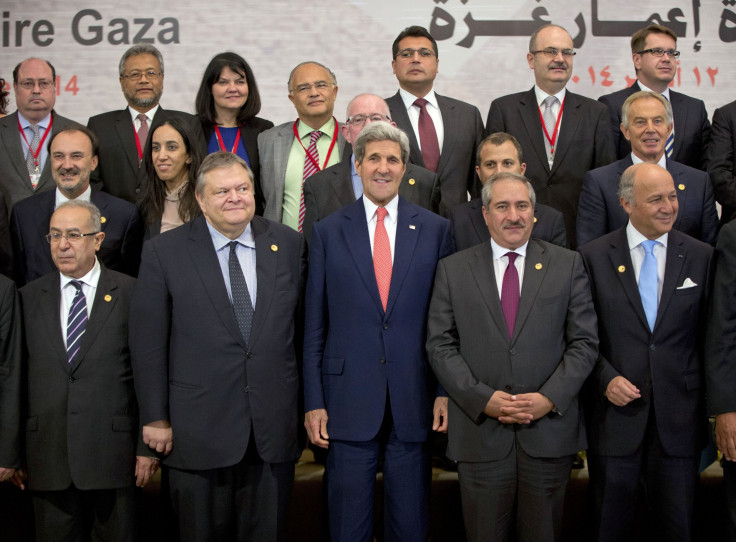Gaza War Aid Blocked By Israel As Homes Remain In Ruins

When Abeer Ayyoub, 28, looks out her bedroom window, she’s reminded of the destruction that struck her Gaza City neighborhood one year ago. Her neighbor's home, the target of an Israeli airstrike, has sat in disarray with one floor completely bombed out since last summer's war. "It’s always reminding me of those horrible days,” Ayyoub, a journalist, said.
The war between Israel and Hamas resulted in the deaths of more than 2,200 Palestinians last summer, and saw more than 9,000 homes collapse to rubble. But reconstruction has been slow, and a year on, not a single home has been rebuilt, according to the United Nations.
The slow-moving recovery is far from the vision aid workers and statesmen expressed when they convened at a summit last October in Cairo to address humanitarian need in Gaza. Of the more than $5 billion that was pledged at the summit, less than 30 percent of that promised amount has actually come through. Qater, which pledged one billion dollars, has so far delivered on only about 10 percent of their promise, while Turkey, which pledged $200 million, has produced just $520,000, according to data on the World Bank's website. The U.S. has met 84 percent of its $212 million promise. The primary setback in reconstruction, however, has been Israeli restrictions on much-needed goods allowed in Gaza, the World Bank said.
Ayyoub said following last summer's war, Palestinians were hopeful that promises of reconstruction and easing restrictions on Gaza's borders would help improve quality of life in the war's aftermath. "But all we got was thousands dead, thousands injured and thousands of homes destroyed," she said.

About 100,000 people are believed to remain displaced, and the country’s economy is today worse than it has been in decades. An estimated 43 percent of adults are out of work – the highest unemployment rate in the world – and 80 percent of Gaza’s population now relies on some form of humanitarian support, a World Bank report found.
Raji Sourani, director of the Palestinian Center for Human Rights, a Gaza-based rights group, said despite Gaza’s high level of education, there are increasingly fewer opportunities for Palestinians. “I never experienced anything close to this situation, it’s really hard, and tough, and unprecedented… it’s a big humanitarian disaster,” he said.
The World Bank, tasked with overseeing reconstruction pledges, has said the slow recovery could be attributed to Israel’s severe limitations on goods allowed in Gaza. “Currently, the binding constraint on Gaza’s recovery is not financing, but the limitations on imports of construction materials into Gaza,” their May report read.
The restrictions, which have wavered in their leniency over the years, have been in place since the Palestinian Islamist faction, Hamas, won an election in 2007. Israel, which considers Hamas a terrorist organization, imposed its seal on Gaza in a stated attempt to prevent Palestinian militants from getting their hands on materials that could be used to build weapons and tunnels, which in the past have been used to stage attacks on Israel. The restrictions apply not only to traditional military supplies, but also cement, concrete and steel. At the same time, rights groups say the restrictions have had a detrimental impact on Gaza’s civilian population.
In a request for comment by the International Business Times, a spokesman for Israel's Coordination of Government Activities in the Territories referred to a chart posted on its Facebook page alleging that one million tons of concrete has entered Gaza since October 2014. Israeli officials have in the past downplayed or denied humanitarian suffering in Gaza, a point that has been challenged by humanitarian workers' accounts.
“This is definitely the worst Gaza has ever been,” Chris Gunness, of the United Nations Relief and Work Agency, a division of the United Nations operating in the Palestinian Territories said, noting that some parts of Gaza still look as though they were struck by an earthquake. “Even if we rebuilt Gaza, it’s already been condemned because they can’t export,” he said.
His organization, which provides needs and services to Palestinians, is facing its own financial crisis. A growing gap between needs on the ground and the generosity of donors has put the organization, like others operating in the region, in a financial bind. The more than 80 percent of Palestinians in Gaza now relying on humanitarian support have drained the organization’s funds, and as the refugee flow from Syria continues unabated, funds that might otherwise have gone to the war-torn strip are being diverted.
Gunness called the growing reliance on aid “unsustainable” and said policies regarding import and export to Gaza need to change. On Wednesday, Israeli leaders nodded to the idea, as top military officials called for an easing of Gaza’s blockade, which they said could, in turn, boost Israel's security by stabalizing the West Bank.
Ayyoub, the Palestinian journalist, said families are in need of much more than what the U.N. is able to provide. "People rely totally, completely on this aid, and sometimes they're large families and it's not enough. Food is not the only thing people need; when it comes to medicine and other needs, people can't afford it," Ayyoub said.

Since Hamas was elected to power in 2007, Israel has launched three major operations in the Gaza strip. Last summer’s war, called Operation Protective Edge by Israel, was the worst the strip has seen yet in terms of damage and casualties. "I traveled all over the Gaza Strip as a human rights activist, and I can assure you one thing: no one thought they would be alive the next morning," Sourani, of the Palestinian Center for Human Rights, said.
Sourani expressed concern for Gaza's future, though he said he tries to hold on to a level of cautious optimism. He’s concerned by the toll the ongoing humanitarian crisis has had on the rising generation, many of whom have now grown up in the rubble of their homes and have experienced three wars in a six-year span. Repeated studies have shown that children in Gaza experience high levels of post-traumatic stress disorder symptoms. “This generation knows nothing about Israelis except the attacks, the bombs, the bullets, the tanks. They don’t know any other thing about the Israelis, other than these people inflict unemployment and death, inflict poverty,” Sourani said.
Hamza Moghari, a 21-year-old nursing student from central Gaza City who also considers himself an activist and writer, said the humanitarian assistance his family and others receive from the U.N. is simply not enough as the situation in Gaza continues to deteriorate. In recent years, his father has worked in construction, he said, but has failed to secure a job with Israel's restrictions on materials like concrete.
“There are many like my father who can't find work, so they just sit at home... The situation has been so difficult here, and it’s getting harder and harder and harder,” he said. "We deserve living in peace and security."
© Copyright IBTimes 2024. All rights reserved.





















